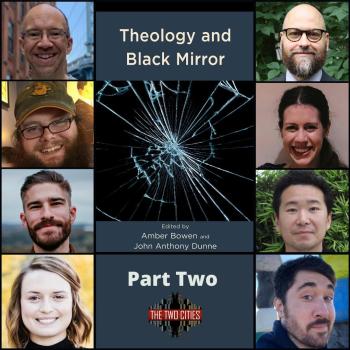One of the things that struck me when reading John Scalzi’s novel Redshirts was how much theology was woven into the fabric (of those red shirts). And the fact that the central character had attended an alien seminary and, despite some ridicule and suggestion that this primed him to believe ridiculous weird stuff, his character struck just the right balance between openness to the seemingly absurd and skepticism towards the seemingly obvious to get at a surprising underlying truth.
Perhaps Redshirts is not the best way to introduce a blog post about seminary. If not, feel free to ignore what preceded. And feel free to ignore this sentence, too, in which I observe how cool it is that students at several seminaries in Chicago are interacting (1) with one another and (2) with science fiction and imagination.
But if the part that resonates with you meaningfully only starts here, we had a good conversation in my Sunday school class recently about the fact that we less frequently nowadays identify young people as likely candidates for ministry, and we far from often encourage them to consider that prospect early. The young people in our churches may seem devout or derailed or anything else, but rarely do we think of them as possible ministers in churches. A prophet is not without honor except in her or his own church. And so we assume that, if a calling is appropriate, that will become apparent to them later on, in the course of pursuing some other career. It is obviously awkward to serve in a professional ministry role within a community you grew up in. But there are ways we could do more to involve younger members in ministry in ways that might help them consider it as a vocation, whether full time or in a lay capacity. As congregations find themselves less and less able to pay full time staff, the latter category becomes ever more important.
If you are American Baptist, or just interested in seeing what that denomination has done, read about the partnership they developed with Northern Seminary starting this academic year, and the grants available for those who wish to participate in the program. Scot McKnight, who teaches at Northern, recently offered those interested a chance to glimpse one of their classes.
Returning to the starting point of this post, people in ministry in churches tend to take on one of two roles on the worst sci-fi TV shows: they are the lead characters who are viewed as always above the fray, whose command should never be questioned, and who never suffer long-term consequences while others around them are treated as expendable; or otherwise they are a congregation’s redshirts, the ones who are expendable and will be pushed into the line of fire and then made to disappear from the story in the interest of the congregation’s own ongoing story and mission. A key to fostering more pursuit of the vocation of ministry is surely to begin providing healthier and more balanced models that are more likely to make it seem worthwhile, rather than a path best avoided, or to be pursued only if one is equally narcissistic and authoritarian like the commanding officer.
Or, to move from John Scalzi to Black Mirror in my analogy, churches that resemble the U. S. S. Callister cannot but foster either mutiny against or emulation of the self-proclaimed god of that toxic bubble universe.
Of related interest:
Women and the call to ministry


















